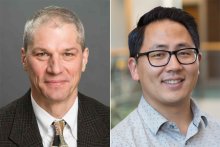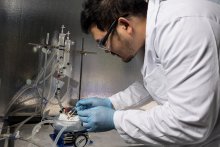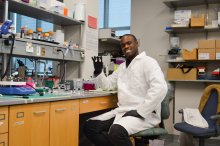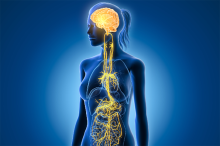News

CSE Professor Hubert Lim named director of Bakken Medical Devices Center
Posted
Biomedical Engineering Professor Hubert Lim has been selected as the next director of the University's Earl E. Bakken Medical Device Center (Bakken MDC).

U of M celebrates selection of Minnesota MedTech 3.0 as federal Tech Hub
Posted
The Minneapolis Saint Paul Economic Development Partnership has been selected by the U.S. Department of Commerce as one of its inaugural Tech Hubs. The University of Minnesota College of Science and Engineering partnered in the formulation and execution of the MedTech 3.0 concept.

University of Minnesota receives $53.9 million to advance health research
Posted
Two University of Minnesota engineering professors are part of the leadership team that will administer a $53.9 million grant from the National Institutes of Health to find better, faster ways to bring scientific advances to real-world use.

Researchers perform first successful transplant of functional cryopreserved rat kidney
Posted
In a groundbreaking new study, engineers and medical researchers at the University of Minnesota Twin Cities have proven the life-saving potential of long-term organ preservation at ultra-low temperatures by successfully transplanting a rewarmed kidney in a rat and restoring full kidney function.

UMN professor part of team that has received FDA approval for new tinnitus treatment
Posted
A University of Minnesota Twin Cities researcher is part of an international team that has developed a new device that could help millions of people worldwide with tinnitus or “ringing of the ears.” The non-invasive device, called Lenire, is now available in the United States.

U of M researchers develop technique for rapid detection of neurodegenerative diseases like Parkinson’s and Chronic Wasting Disease
Posted
University of Minnesota Twin Cities researchers have developed a groundbreaking new diagnostic technique that will allow for faster and more accurate detection of neurodegenerative diseases that affect humans, such as Alzheimer's and Parkinson's, and similar diseases that affect animals, such as chronic wasting disease (CWD) and mad cow disease.

The sky’s the limit for biomedical engineering Ph.D. student Marcus Flowers
Posted
College of Science and Engineering graduate student Marcus Flowers engineers the materials behind drug delivery, and his research applications span everything from stem cell therapy to cancer treatment.

CSE’s HumanFIRST Lab helps engineer systems with people in mind
Posted
From creating a national standard for crash reporting to investigating healthcare disparities for women in the military, the College of Science and Engineering’s HumanFIRST Lab brings a community focus to engineering research.

Researchers use disease simulators to evaluate potential cancer treatments
Posted
Like pilots using a flight simulator to practice a perfect landing, a team led by University of Minnesota biomedical engineers is using disease simulators to evaluate potential cancer treatments.

University of Minnesota awarded $21M to lead research revealing effects of vagus nerve stimulation in humans
Posted
University of Minnesota Twin Cities researchers, including a biomedical engineering professor, are leading a comprehensive global clinical study that seeks to reveal the functional effects of vagus nerve stimulation (VNS) across the human body.
